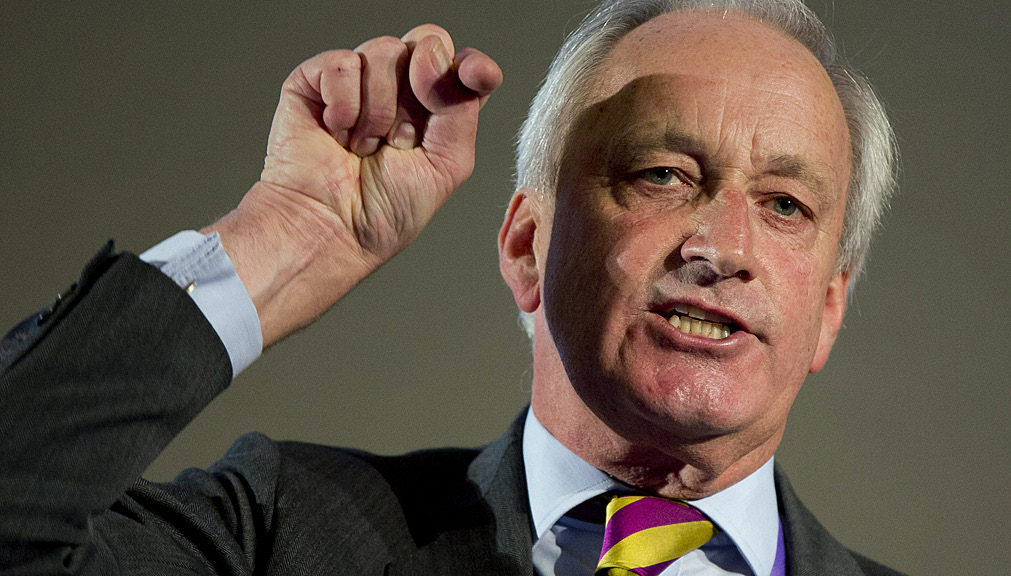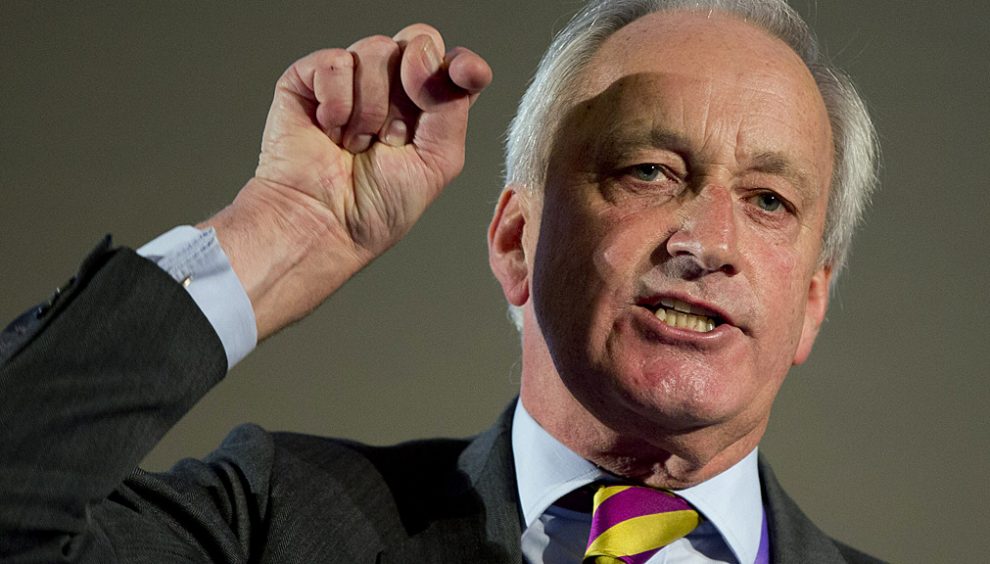
gives his views on the Brexit
ONE OF the fairly small band of Welsh politicians who were pleased with the outcome of last Thursday’s EU referendum was UKIP’s Senedd Leader Neil Hamilton, who has been an outspoken supporter of Free Trade since before the UK joined the Common Market in 1973.
The Herald spoke to the Mid and West AM on Friday morning (Jun 24) to discuss his thoughts on what this historic result would mean for Wales.
“It’s a historic day for Wales – I’ve been fighting for this for 49 years , since I joined the Anti-Common Market League in 1967 when I was at school in Ammanford,” he said.
Given that, with the exception of Ceredigion, Mid and West Wales voted Leave, was he pleased with the local result?
“The result from Carmarthenshire was extremely good. It was 55/45 wasn’t it? So it was better than the national average,” he said. “I’m very, very, pleased. Carwyn Jones’ and Leanne Wood’s constituencies both voted to leave so that’s very satisfying as well.”
Given that, even at the time of writing, another EU referendum looks unlikely, and leaders of the major political parties appear to have accepted that Britain will leave the EU, we asked Mr Hamilton what he thought leaving the EU would mean for Wales.
“First of all , it means there will be more money for Wales, and I’m going to issue a demand today (Jun 24) that the government should guarantee that Wales gets the taxpayers money which is currently spent by the EU in Wales and avoid the possibility that this is siphoned off somewhere else in the UK,” he said.
“And then there will be a Brexit dividend from £10bn a year we send to Brussels which is spent in other parts of Europe. We should have at least £500m a year out of that.”
Wales is used to the NHS being treated as a political football, but did Mr Hamilton think that the increase in NHS funding – promised by both Leave campaigns – would materialise?
His response appeared rather more measured than some of the rhetoric used by Leavers like Boris Johnston during the campaign: “The money is there to spend and we, via our elected politicians , will decide where,” he said. “The NHS is a priority, and I would expect that a certain part of that will be spent on the health service.”
In the interests of fairness, it is worth mentioning that the £350m a week figure which Britain apparently spent on the European Union rather than the NHS was not endorsed by UKIP.
Another matter which is almost sure to prove contentious in the coming months is the subsidies received by Welsh farmers from the EU – most notably the Common Agricultural Payment (CAP). We asked Mr Hamilton whether he would be leading calls for the UK Government to provide a similar level of subsidisation for the industry in Wales.
In response, he claimed that leaving the EU could actually lead to an upturn in farmers’ fortunes: “What we need is a guarantee that at least the same amount of money as the EU spends in Wales – it’s all British taxpayers’ money anyway – should be given to the Welsh Government for it to spend,” he stated.
“And obviously agricultural subsidies are another very high priority, particularly because Wales has so many marginal upland farms.
“We can provide a better system of agricultural subsidy and income support than the CAP and we can have cheaper food into the bargain. It will be good for farmers and consumers.”
While UKIP exceeded expectations across South Wales in the Assembly elections, the party was still some way behind Labour in the region. However , the Leave vote, in spite of Labour MPs and AMs supporting Remain, was particularly strong in the old industrial heartland of the country, from Llanelli to Ebbw Vale. We asked Mr Hamilton why he thought this was the case.
The former Conservative MP suggested that this was the result of disillusionment with mainstream political parties, particularly Labour.
“The Labour Party had given up their working class base. The Labour leadership are very multicultural urban-orientated – they’ve given up on the old industrial communities which founded the Labour Party,” he claimed.
“That is why UKIP is doing so well in the Valleys seats. We got 25% of the vote in places like Merthyr and Ebbw Vale in May, and we’re going to build on that. Our aim now is to replace the Labour Party in those Labour-voting areas.”
“I know that at the General Election last year , UKIP’s support base was the most working class of the major political parties in Britain – much more than the Labour Party.
“The people who run the Labour Party today are middle class academics and professionals who have lost their touch with the ordinary working man. UKIP is a grassroots movement full of ordinary people, so we’re much more representative than the Labour Party,” the former barrister and reality TV star added.
With a minority Labour Government running Wales at present (again) and the leader of the Welsh Conservatives an advocate of Brexit, we asked what role UKIP would play in post-EU negotiations.
“I said in my very first speech in the Senedd that we were going to be a constructive opposition party and we wanted to play a full part in getting the best deal for Wales, ” Mr Hamilton said.
“Of course, that was contemptuously rejected by Carwyn Jones and Leanne Wood, who tried to do their own downstairs stitch-up deal.
“UKIP has seven AMs in the Senedd and support in constituencies. We represent 15% of the people of Wales and we cannot be ignored. I’m going to give support to the demands by the Welsh Government that we should get our fair share of the Brexit dividend.”
When we spoke to Mr Hamilton, the pound had just plummeted to its worst level since the 1987 crash. We asked whether he thought this would be a short-term blip.
He agreed, and wasted no time in laying the blame for the pound’s poor showing squarely at the door of ‘so-called experts.’
“This volatility has taken place because the so-called experts we were told up till yesterday we had to believe didn’t see it coming,” he insisted. “Markets don’t like upset – they don’t like being wrong-footed. It’s a great time to buy at the moment, and the market will bounce back over the next two weeks.
“It will become absolutely clear in no time at all that the doom-mongering scenario the government itself went into overdrive to promote is entirely bogus, and we will carry on trading with Europe and the rest of the world. In the short term , nothing’s going to change, but in the longer term there’s a world of opportunity.”
The so-called ‘Project Fear’ campaigners suggested that a number of businesses could leave Britain if the country gave up EU membership. However, even accepting that was the case, did he think that uncertainty over Britain’s future would discourage new inward investment over the coming years?
Mr Hamilton did not. “I think when people decide to make an investment they look at the whole business environment, particularly staff, and if we have a better regulatory environment than across the channel then businesses are going to invest here,” he claimed.
“They have done for centuries. We have access to the Single Market in the same way as the United States, Canada, Australia, India and China. There is a tariff wall around the EU but that is relatively small – an average of 4%.
“We have a massive trade deficit with the EU so it is pretty much in their interest to agree to a free-trade agreement, which is what we should very quickly put together.”
Mr Hamilton also dismissed suggestions that Britain should ‘buy in’ to the Single Market: “All we want is free trade, and even if we didn’t do a deal with the EU for the Single Market , we would still have access to it.
“All we would have is a tariff barrier, which is on average 4%. We would put a similar tariff on EU exports to us. There is a hundreds of billion pounds deficit in terms of the EU so if they try to discriminate against us , they will be the losers,” he added.
“We will get the benefits of tariffs on their exports to us which we could then return to our exporters so it is more than self-financing.”
One of the claims made by senior figures in the Brexit campaign was that without EU membership, Britain would be in a position to protect its industries, and possibly part-nationalise struggling firms like Tata Steel.
However, Mr Hamilton felt that this would not be a positive move: “The future lies with free trade not with protectionism,” he added. “But, take steel for example. Where foreign competition is unfairly subsidised as it is , with Chinese steel we can take protective measures to even the playing field as the United States has done.”
Renationalising struggling industries was also not on the cards, except as a short-term measure. “Well we could do it, but I don’t think nationalisation is the way forward. Politicians running industries has not proved to be very successful in the past.
“Sometimes as a temporary measure , the government needs to step in. But , it should never be a long-term option in my opinion,” he added.
Looking forward, Mr Hamilton ‘believed that Wales had a bright future outside the EU.’


















Add Comment